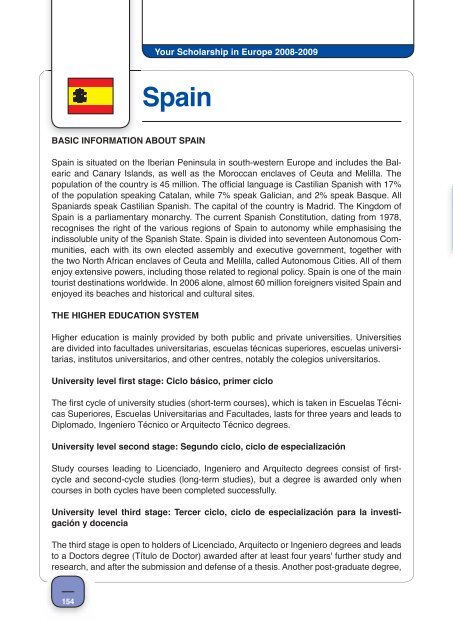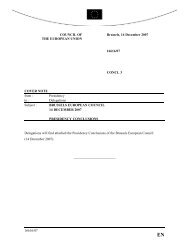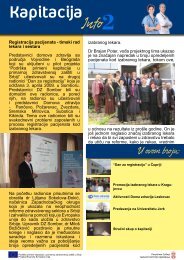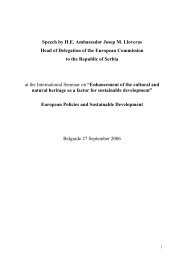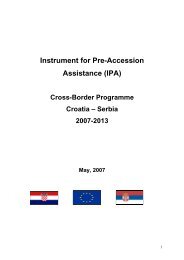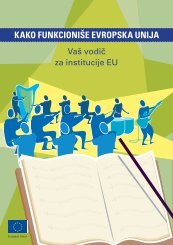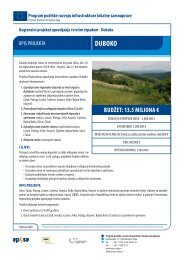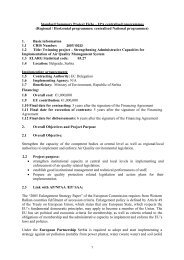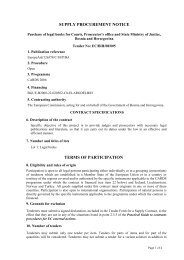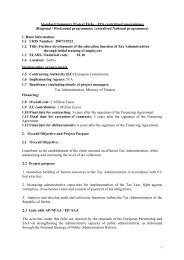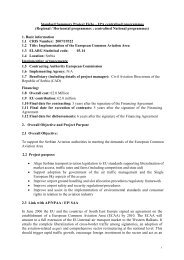YOUR SCHOLARSHIP IN EUROPE
YOUR SCHOLARSHIP IN EUROPE
YOUR SCHOLARSHIP IN EUROPE
You also want an ePaper? Increase the reach of your titles
YUMPU automatically turns print PDFs into web optimized ePapers that Google loves.
154<br />
Your Scholarship in Europe 2008-2009<br />
Spain<br />
BASIC <strong>IN</strong>FORMATION ABOUT SPA<strong>IN</strong><br />
Spain is situated on the Iberian Peninsula in south-western Europe and includes the Balearic<br />
and Canary Islands, as well as the Moroccan enclaves of Ceuta and Melilla. The<br />
population of the country is 45 million. The offi cial language is Castilian Spanish with 17%<br />
of the population speaking Catalan, while 7% speak Galician, and 2% speak Basque. All<br />
Spaniards speak Castilian Spanish. The capital of the country is Madrid. The Kingdom of<br />
Spain is a parliamentary monarchy. The current Spanish Constitution, dating from 1978,<br />
recognises the right of the various regions of Spain to autonomy while emphasising the<br />
indissoluble unity of the Spanish State. Spain is divided into seventeen Autonomous Communities,<br />
each with its own elected assembly and executive government, together with<br />
the two North African enclaves of Ceuta and Melilla, called Autonomous Cities. All of them<br />
enjoy extensive powers, including those related to regional policy. Spain is one of the main<br />
tourist destinations worldwide. In 2006 alone, almost 60 million foreigners visited Spain and<br />
enjoyed its beaches and historical and cultural sites.<br />
THE HIGHER EDUCATION SYSTEM<br />
Higher education is mainly provided by both public and private universities. Universities<br />
are divided into facultades universitarias, escuelas técnicas superiores, escuelas universitarias,<br />
institutos universitarios, and other centres, notably the colegios universitarios.<br />
University level fi rst stage: Ciclo básico, primer ciclo<br />
The fi rst cycle of university studies (short-term courses), which is taken in Escuelas Técnicas<br />
Superiores, Escuelas Universitarias and Facultades, lasts for three years and leads to<br />
Diplomado, Ingeniero Técnico or Arquitecto Técnico degrees.<br />
University level second stage: Segundo ciclo, ciclo de especialización<br />
Study courses leading to Licenciado, Ingeniero and Arquitecto degrees consist of fi rstcycle<br />
and second-cycle studies (long-term studies), but a degree is awarded only when<br />
courses in both cycles have been completed successfully.<br />
University level third stage: Tercer ciclo, ciclo de especialización para la investigación<br />
y docencia<br />
The third stage is open to holders of Licenciado, Arquitecto or Ingeniero degrees and leads<br />
to a Doctors degree (Título de Doctor) awarded after at least four years' further study and<br />
research, and after the submission and defense of a thesis. Another post-graduate degree,


